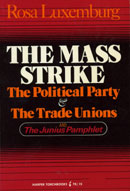

|
|

The Mass Strike, the Political Party and the Trade Unions
Luxemburg, Rosa
http://www.connexions.org/CxArchive/MIA/luxemburg/1906/mass-strike/index.htmhttp://www.marxists.org/archive/luxemburg/1906/mass-strike/index.htm Publisher: Harper & Row, New York, USA Year Published: 1906 Pages: 228pp ISBN: 06-131583-4 Dewey: 331.88 Resource Type: Book Cx Number: CX6432 Luxemburg writes that "the mass strike in Russia [in 1905] has been realised not as means of evading the political struggle of the working-class, and especially of parliamentarism, not as a means of jumping suddenly into the social revolution by means of a theatrical coup, but as a means, firstly, of creating for the proletariat the conditions of the daily political struggle and especially of parliamentarism. The revolutionary struggle in Russia, in which mass strikes are the most important weapon, is, by the working people, and above all by the proletariat, conducted for those political rights and conditions whose necessity and importance in the struggle for the emancipation of the working-class Marx and Engels first pointed out, and in opposition to anarchism fought for with all their might in the International." Abstract: - Excerpts: The mass strike is the first natural, impulsive form of every great revolutionary struggle of the proletariat and the more highly developed the antagonism is between capital and labour, the more effective and decisive must mass strikes become. The chief form of previous bourgeois revolutions, the fight at the barricades, the open conflict with the armed power of the state, is in the revolution today only the culminating point, only a moment on the process of the proletarian mass struggle. And therewith in the new form of the revolution there is reached that civilising and mitigating of the class struggle which was prophesied by the opportunists of German social democracy - the Bernsteins, Davids, etc. It is true that these men saw the desired civilising and mitigating of the class struggle in the light of petty bourgeois democratic illusions - they believed that the class struggle would shrink to an exclusively parliamentary contest that and that street fighting would simply be done away with. History ahs found the solution in a deeper and finer fashion: in the advent of revolutionary mass strikes, which, of course, in no way replaces brutal street fights or renders them unnecessary, but which reduces them to a moment in the long period of political struggle, and which at the same time unites with the revolutionary period and enormous cultural work in the most exact sense of the words: the material and intellectual elevation of the whole working class through the 'civilising' of the barbaric forms of capitalist exploitation. ... is there not a gross contradiction in the picture we have drawn? On the one hand it means that in an eventual future period of political mass action the most backward layers of the German proletariat - the land workers, the railwaymen, and the postal slaves - will first of all win the right of combination, and that the worst excrescences of exploitation must first be removed and on the other hand, the political task of this period is said to be the conquest of power by the proletariat! On the one hand, economic, trade-union struggles for the most immediate interests, for the material elevation of the working class; on the other hand the ultimate goal of social democracy! Certainly these are great contradictions, but they are not contradictions due to our reasoning, but contradictions due to capitalist development. It does not proceed in a beautiful straight line but in a lightning-like zig-zag. Just as the various capitalist countries represent the most varied stages of development, so within each country the different layers of the same working class are represented. But history does not wait patiently till the backward countries, and the most advanced layers have joined together so that the whole mass can move symmetrically forward like a compact column. It brings the best prepared parts to explosion as soon as conditions there are ripe for it, and then in the storm of the revolutionary period, lost ground is recovered, unequal things are equalised, and the whole pace of social progress changed at one stroke to the double-quick. Table of Contents: The Russian Revolution, Anarchism and the General Strike The Mass Strike, A Historical and Not an Artificial Product Development of the Mass Strike Movement in Russia The Interaction of the Political and the Economic Struggle Lessons of the Working-Class Movement in Russia Applicable to Germany Co-operation of Organised and Unorganised Workers Necessary for Victory The Role of the Mass Strike in the Revolution Need for United Action of Trade Unions and Social Democracy Subject Headings
|